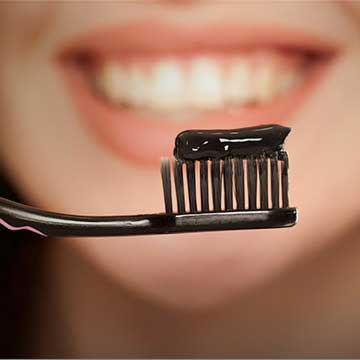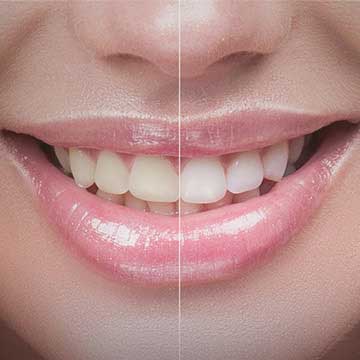Tooth sensitivity can come in varying shades of pain, but the root causes are few. When you’re going in for a dental exam — you may complain of shooting pain in your teeth or gums whenever you drink hot or cold beverages. The good news is, there’s help if you need it, and understanding the causes can prevent sensitive teeth from getting worse.

What is Tooth Sensitivity?
With the understanding of a tooth’s layers in mind, tooth sensitivity can be boiled down to a simple cause. Destruction of enamel caused by tooth wear, recession of the gums, or tooth decay. Enamel protects your dentinal tubules (channels conveying nutrients from the pulp chamber) from outside heat or pressure. Dentin is the second layer of tooth structure underneath the enamel.
Enamel
Enamel is a hard, translucent substance coating the tooth’s crown (the portion of the tooth that you can see above the gums). It is the hardest substance in the body composed of minerals, and it can be damaged if it’s not cared for properly. Enamel can be destroyed by clenching and grinding as well as acidic habits such as routine consumption of lemon water. Dental cavities also destroy enamel.
Without sufficient enamel thickness, there is not enough insulation. Because of that, tooth sensitivity often owes to the thinning of the crown’s enamel, so the tubules within your dentin become exposed to the oral environment.
Cementum
Enamel doesn’t cover all the surfaces of the teeth. Under the gum line and on the roots, a hard layer of cementum covers the dentin and connects to your jawbone by way of a ligament called the periodontal ligament or “PDL”.
Oversensitivity might come from the recession of the gum line past the point on the tooth where the enamel runs out, giving way to cementum, which isn’t as tough as enamel. When heat or pressure acts on cementum, it can disturb the dentinal tubules under the cementum.
Either way, the acid byproduct of plaque, heat or cold from what you consume, or simply biting down — can all send alarm signals to the nerve endings in your tooth’s pulp chamber or root canal. The result is the experience of tooth sensitivity. To prevent, manage, or treat tooth sensitivity, try these 10 tips.
Improve Your Hygiene Efforts
Brushing and flossing daily are hugely important to oral health in general. If done correctly, it can prevent cavities and gum disease. Sometimes dental caries (A.K.A. cavities) are mistaken for tooth sensitivity, and they can certainly affect people at the same time! But if you let plaque build up, acid eats away at the enamel, leading to sensitive teeth. Plaque that is not cleaned properly from exposed root surfaces (caused by gum recession) can also contribute to sensitivity.
Use an Extra Soft Toothbrush
If you put too much elbow grease into brushing your teeth, you can wear your enamel away and traumatize the gum line — which may then recede. Soft bristles, combined with less aggressive brushing technique, can preserve your enamel thickness and prevent gum recession.
Use Over-the-Counter Sensitive Toothpaste
Toothpaste made for sensitive teeth is designed to block dentinal tubules.It won’t cure sensitive teeth, but it can help you manage it. You must continue to use a sensitive toothpaste to maintain its effectiveness. Your dentist or dental hygienist will be able to suggest a desensitizing toothpaste to suit your needs.
Cut down on Acidic Food & Drink
If your tooth sensitivity comes from chewing on and sipping acidic foods and beverages — you may want to avoid them from now on. People that do not have sensitive teeth should also avoid frequent consumption of acidic food and drink. Often processed for consumption, acidic foods and drinks include carbonated drinks, pop, sodas, lemon water, sports drinks like Gatorade, wine, beer, citrus fruits and juices, and sour herbal teas. These drinks should be limited to 3-4 servings per week.
Eat food that is high in fiber and low in sugar
Food that is high in sugar and low in fiber is generally easier for bacteria to consume, meaning you’ll develop more plaque (and acid from plaque) than you would with raw vegetables.If you can eat more whole foods, it can go a long way in preventing further tooth sensitivity and tooth decay. Your general health could improve as well!
Rinse Your Mouth After Food & Drink
Whether your diet consists of processed or unprocessed food, rinsing the microscopic particles gives bacteria causing plaque much less to go on. It can really help if brushing your teeth after meals isn’t feasible.
Wear a Nightguard
Sometimes tooth sensitivity can be caused by grinding your teeth, which quickly wears down your enamel while you sleep. Clenching and grinding can also irritate the periodontal ligament causing tooth pain and sensitivity. Your dentist may suggest a well-fitted mouthguard to wear while sleeping. While a mouthguard won’t prevent you from grinding your teeth, it will protect your enamel.
Maintain your Dental Fillings
When a dental filling is worn or leaking due to tooth decay it can cause sensitivity. It is important to have a dental exam and xrays yearly to evaluate your existing dental work. The sooner you act when a tooth becomes sensitive, the better the chance your dentist can find a solution for you So reach out in the case of a dental emergency!
Opt for Fluoride Gel
Fluoride is an option at your routine dental cleaning. Getting fluoride treatment on your teeth protects your enamel, so it’s more resistant to acids that can wear it down. Since plaque and acidic food can’t really be reduced to zero, it’s a good idea to let your dentist know you’re interested in fluoride treatment — whenever high fluoride toothpastes aren’t doing the trick.
Surgical Gum Grafting
In some cases gum line recession can be severe, leaving the root of the tooth overexposed. Excessive exposure of a tooth’s root means the tooth’s sensitivity feels extreme. In this case, a dentist may refer you to a gum specialist. Once gum tissue forms up around the root again, you may feel less sensitivity.
Ask Your Dentist About Sensitive Teeth
Your dentist can weigh in more on what your options are in dealing with tooth sensitivity. Keep up your hygiene regimen, and implement as many of these tricks as you can. You might notice your sensitivity improving, or at least not getting worse! If you need more guidance you can always request an appointment for more comprehensive care!








